Theresa Smith's Blog, page 120
November 3, 2018
Sunday Spotlight with Fleur McDonald — Australian Women Writers Challenge Blog
Chatting with Fleur McDonald about her latest release, Where the River Runs, over at the Australian Women Writers blog for Sunday Spotlight this morning.
Today I warmly welcome Fleur McDonald to Sunday Spotlight, here to chat about her latest release, Where the River Runs. What provided the inspiration for the story threads in Where the River Runs? When I was growing up, it was common knowledge there was a grave of a little boy on my grandparent’s station. The…
via Sunday Spotlight with Fleur McDonald — Australian Women Writers Challenge Blog
November 2, 2018
Bingo! The Football Whisperer by Mel A Rowe
Book Bingo is getting even more challenging with only a few squares left. I am borderline cheating this round as I attempt to check off:
A book with non-human characters
Now, it doesn’t have the word ‘exclusively’ in there, so I’m going to go with the idea that there can also be human characters and as long as there is a stand out non-human, it should fit the bill. In this case, The Football Whisperer by Mel A Rowe is my pick because the pit-bull named Max in this story had a personality all of his own and a strong presence in many scenes throughout the book.
[image error]
I absolutely loved how Max, a traumatised and wounded rescued pit bull, decided to make Ward his person. And correspondingly, how Ward, who was not a dog person at all and who was also more than a little wary of Max, found himself bonding with this animal in a way that saw the two of them recovering from trauma together. I always love a story that involves animals healing humans and vice versa – I got both in this novel!
This year I’m playing book bingo with Mrs B’s Book Reviews. On the first and third Saturday of each month, we’ll post our latest entry. We’re not telling each other in advance what we’re currently reading or what square we’ll be filling next; any coincidences are exactly that – and just add to the fun!
Follow our card below if you’d like to join in, and please let us know if you do so we can check out what you’re reading.
Now I’m off to check out what square Mrs B has marked off for this round. See you over there!
[image error]
November 1, 2018
New Release Book Review: The King’s War by Mark Logue and Peter Conradi
About the Book:
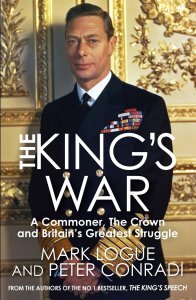
The extraordinary follow-up to the international bestseller The King’s Speech
The broadcast that George VI made to the nation on the outbreak of war in September 1939 – which formed the climax of the multi Oscar-winning film The King’s Speech – was the product of years of hard work with Lionel Logue, his iconoclastic Australian-born speech therapist. Yet the relationship between the two men did not end there. Far from it: in the years that followed, Logue was to play an even more important role at the monarch’s side.
THE KING’S WAR follows this relationship through the dark days of Dunkirk and the drama of D-Day to eventual victory in 1945 – and beyond. It is written by Peter Conradi, a Sunday Times journalist, and Mark Logue, Lionel’s grandson, whose previous book, The King’s Speech: How One Man Saved the British Monarchy, was a best-seller in Britain and America and translated into more than 20 languages.
The book draws on exclusive material from the Logue Archive – the collection of diaries, letters and other documents left by Lionel and his feisty wife, Myrtle. It provides a fascinating portrait of two men and their respective families – the Windsors and the Logues – as they together faced up to the greatest challenge in Britain’s history.
My Thoughts:
Following on from The King’s Speech, The King’s War examines the relationship between Lionel Logue and King George VI throughout the war years and beyond, up until the deaths of both men. More than this though, it is a detailed account of Britain at war, specifically, Londoners, and what they endured for the six long years of WWII. Intimate and anecdotal, The King’s War reads in a way that is as accessible as fiction, yet its content is grounded in facts. I found this book to be incredibly engaging, and it really opened my eyes to the war years in Britain, a history that I have only ever explored in the most casual of ways.
‘…and then one by one, as a switch was pulled, each area went dark, the dazzle becoming a patchwork of lights being snuffed out here and there until a last one remained, and it too went out. What was left was more than just wartime blackout, it was a fearful portent of what war was to be. We had not thought that we would have to fight in darkness, or that light would be our enemy.’ – Felicity Goodall, Life during the blackout, Guardian, 1 Nov 2009.
I have not read The King’s Speech but I did watch the film and enjoyed it immensely. From that film, I then hopscotched over to The Crown, which I also enjoyed. George VI is a King that interests me greatly. He came to the job with reluctance and an impediment, both of which he overcame, becoming a most beloved monarch. My views on him have been confirmed through reading The King’s War, and I feel as though he was a man to be greatly admired. His working relationship with Logue spilled into friendship, and this was really heart-warming to read about. There was so much respect and admiration evident between the two men, and the appreciation that the immediate royal family and household had for Logue was apparent. When you think back to that speech the King made at the beginning of the war, the progress he charts over the course of his life is phenomenal. There are so many people who never control their stammers to the degree that he was able to accomplish, and for one in such a high profile position, that he did overcome it is testimony to the hard work on the part of both the King and Logue.
‘I wonder if you realise how grateful I am to you for having made it possible for me to carry out this vital part of my job. I cannot thank you enough.’ – King George VI in a letter to Lionel Logue
‘When a fresh patient comes to me the usual query is – “Will I be able to speak like the King?”, and my reply is, “Yes, if you will work like he does” – I will cure anyone of intelligence if they will only work like you did – for you are now reaping the benefit of this tremendously hard work you did at the beginning. I look forward to the initial preparation of your speeches with keen pleasure, knowing that the delivery will be all that is required, as the greatest pleasure in my life has been the honour of working with you.’ – Lionel Logue in a letter to King George VI
‘I think that I know perhaps better than anyone just how much you helped the King, not only with his speech, but through his whole life and outlook on life. I shall always be deeply grateful to you for all you did for him.’ Elizabeth – Queen Mother in a letter to Lionel Logue after the passing of her husband King George VI
The King’s War is a fine achievement, well researched, but put together with the reader in mind. I enjoyed the anecdotal accounts of the ins and outs of life during the war. The sacrifice that was stoically borne, the deprivations, the relentless attacks from the German air raiders. This is all interwoven with the daily lives of the King and Queen, along with the Logue family, and the ties that bound these two families together. Extracts from the key speeches given throughout the war years, by both Churchill and King George VI, are included, and on more than one occasion the poignancy of these words gave me goose-bumps. The King’s War is an inspiring read. I highly recommend it.

October 31, 2018
New Release Book Review: The Turn of Midnight by Minette Walters
About the Book:
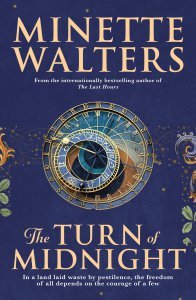
As the year 1349 approaches, the Black Death continues its devastating course across England. In Dorseteshire, the quarantined people of Develish question whether they are the only survivors.
Guided by their beloved young mistress, Lady Anne, they wait, knowing that when their dwindling stores are finally gone they will have no choice but to leave. But where will they find safety in the desolate wasteland outside?
One man has the courage to find out.
Thaddeus Thurkell, a free-thinking, educated serf, strikes out in search of supplies and news. A compelling leader, he and his companions quickly throw off the shackles of serfdom and set their minds to ensuring Develish’s future – and freedom for its people.
But what use is freedom that cannot be gained lawfully? When Lady Anne and Thaddeus conceive an audacious plan to secure her people’s independence, neither foresees the life-threatening struggle over power, money and religion that follows …
My Thoughts:
The Turn of Midnight has been a long awaited release for me. I loved The Last Hours and was ready for this sequel about five minutes after finishing its predecessor. The story picks up exactly where The Last Hours left off, and since it’s been a year between books, Minette kindly provides a concise summary of the story so far in the beginning pages of the book, allowing for the story to continue without any tiresome recaps being threaded through the narrative. In saying this, The Turn of Midnight is not ideal as a standalone read, even with the summary at the start, you really do need to read The Last Hours for complete appreciation of the whole story.
With the threat of the Black Death receding, Thaddeus and his band of boys traverse the countryside gathering intel, accumulating stock and food stores, and looting abandoned wealth. Along the way, an unlikely alliance is formed and an enemy underestimated. The boys have matured greatly since Thaddeus first took them from Develish and their loyalty to each other, as well as to Thaddeus, has strengthened into an unbreakable bond. Develish appears to be the only demense to have remained untouched by the pestilence and Thaddeus sees an opportunity for advancement that has Lady Anne risking all for the independence of her people.
‘She goes against God’s natural order by what she does. All should know their place.’
Lady Anne shines ever more brightly in The Turn of Midnight, with her goodness, her intelligence, and her pure belief in equality setting her apart as a true leader, despite her status as a chattel widow. She offers sensibility in confusing times and forgiveness to all, even to the ones who have betrayed her and accused her the most. She’s such a terrific character, a woman ahead of her times yet still so present within them.
‘To be loved and honoured for who we are, and not what our status represents, is surely the lesson He wanted us to learn when he sent His son to live as a carpenter and not as a king.’
For the survivors of the Black Death, making sense of what has befallen them is proving complicated. Priests and lords lay the blame on the serfs and peasants, citing their sin as the cause, yet questions are raised over why one person and not another has perished. Why an innocent child and not a lecherous man? Why a good priest and not a thieving steward? This questioning of reason is linked intimately to the questioning of religion. The distinction between following the teachings of Christ and believing in God’s word, as opposed to following the interpretation offered through organised religion, remain key themes in this enduring story. It’s this thought provoking content that elevates these two novels well above others within the genre.
‘A deceiver remains a deceiver; a generous heart remains generous. Even had Aristide wanted to preach God’s love, he couldn’t have done it, because instilling fear was the only way he knew to maintain his authority. Wrath and hellfire would always slip more easily off his tongue than forgiveness and redemption.’
‘Oft-repeated doctrines burrowed all too easily into minds when other ideas were suppressed.’
The story clips along at a sharp pace, barely allowing you an opportunity to put it down. The suspense is rife, the clever layers of storytelling second to none. The Turn of Midnight is historical fiction at its finest, a fitting follow up to The Last Hours that had me holding my breath in anticipation on more than one occasion.

October 30, 2018
New Release Book Review: The Kinship of Secrets by Eugenia Kim
About the Book:
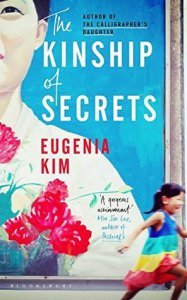
The riveting story of two sisters, one raised in the United States, the other in South Korea, and the family that bound them together even as the Korean War kept them apart.
In 1948 Najin and Calvin Cho, with their young daughter Miran, travel from South Korea to the United States in search of new opportunities. Wary of the challenges ahead, Najin and Calvin make the difficult decision to leave their other daughter, Inja, behind with their extended family; soon, they hope, they will return to her.
But then war breaks out in Korea, and there is no end in sight to the separation. Miran grows up in prosperous American suburbia, under the shadow of the daughter left behind, as Inja grapples in her war-torn land with ties to a family she doesn’t remember. Najin and Calvin desperately seek a reunion with Inja, but are the bonds of love strong enough to reconnect their family over distance, time and war? And as deep family secrets are revealed, will everything they long for be upended?
Told through the alternating perspectives of the distanced sisters, and inspired by a true story, The Kinship of Secrets explores the cruelty of war, the power of hope, and what it means to be a sister.
My Thoughts:
‘This novel is a fiction derived from the facts of my family’s life, and especially my sister’s life, during and after the Korean War, the fifth deadliest war in human history, also known as “the forgotten war”.’ – Author notes.
This novel has impressed me so much more than I could have ever anticipated. It’s a delicate balance of clear expression and deeply moving prose, a story that is quite honestly, unforgettable. And the fact that it is based for the most part on the author’s own family, makes it even more impacting. Some might wonder why, with so much truth embedded into the narrative, the author didn’t write this story as a memoir. Personally, I feel that fiction offers more creative power to most stories, provided you can strike the right balance between truth and narrative, which Eugenia Kim does with a deft hand.
‘Forgive me, Lord, if in the darkest places hidden deep in my heart – hidden even from my own sincerity – there should reside the thought that I have brought the wrong daughter to America.’
The Kinship of Secrets tells the story of two sisters growing up apart. One with her parents in America, the other in South Korea with her extended family made up of her uncle, aunt, and grandparents. The story begins at the outbreak of the Korean War, when the girls are aged three and four years old, and spans through until they are in their mid-twenties. It seems at first unbelievable that a couple would migrate to another country and only take one daughter. As a mother myself, I found this intensely unsettling. Yet, I was unable to reproach Najin, because her loss and sacrifice was so profound. Times were so different, it was no simple matter of hopping on an aeroplane and travelling in comfort like we do today. As reprehensible as it seemed to leave one child behind, I could understand it intimately, and as more information surrounding the decision and what influenced the choosing of one child over the other came to light, the more I understood, and the more my heart cracked open for Najin.
‘Her mind swirled with questions and something dark she didn’t like feeling. Always it was the war. This war, the war before, the one before that. It seemed everyone used it as an excuse for all ills. And perhaps it was.’
I’ve never read a novel about the Korean War before, so I really appreciated gaining such insight into the politics and the conflict, both during the war and in the unsettled years that followed. I draw back to Eugenia Kim’s effortless writing style, so clear and precise, yet never overloading with facts or politics. I felt like I was fully informed, yet never weighted down. By facts, at least. My emotions were another story! There were so many moments, of horror, of simple joy, of human connection, that impacted me greatly.
‘Would she even like her? Something about that thought felt wrong, as if having a sister meant they’d automatically like – and even love – each other. But what if they didn’t?’
The separation of these sisters is the driving force behind this story as we are eternally moving towards a time when they might meet, when Inja might finally be reunited with the family she has no memory of. The difficulties attached to this were explored fully, most notably the emotional side of it. Inja’s uncle was such a incredibly wonderful man, he was truly inspirational in the way he loved Inja and brought her up on his sister’s behalf with such care. But this of course made it all the more harder for Inja to contemplate ever leaving Korea. She loved Korea: her friends, her school, her family. Everything in America was unknown, most particularly, her sister Miran who spoke no Korean, just as Inja spoke no English. These sisters were not only separated by distance, but by culture. It was quite heartbreaking.
‘She was aware of a strange kind of power one gained from holding secrets, and how confidences begat a kind of self-confidence – how the power of secrets required an inner strength and the maturity of discernment to keep them hidden.’
Inja was a favourite of mine but I did really feel for Miran, a Korean girl who was not Korean, if that makes any sense. She was American, but growing up in the era of the Cold War, shadowed by a mythical sister who had been left behind in Korea, who her mother clearly pined for. Inja was a big part of her life, for fifteen years parcels were sent, she shared so many of her things with Inja, without having ever met her. Their language barrier meant they were unable to even exchange letters. The adjustment period for the sisters when they at last lived together was fraught at times, but lined with sincerity. I loved how they made their way with each other, connected by a fragile thread in the web that made up their family history. This is a novel about strong women, about hardship and sacrifice, about love and honour. It’s about finding yourself when you are lost within circumstances not of your own making. The title is particularly profound, especially with regards to Inga, who became quite the secret keeper within the family. So many themes of culture and family are explored alongside the consequences of war. The Kinship of Secrets is a remarkable novel, magnificent in its execution and profoundly beautiful in its narration. This is one I highly recommend.
‘Her mother and grandmother had risen like dragons from the sea floor of a centuries-old, neo-Confucian culture of female oppression. She had been given a tremendous gift of two unique women whose lives – whose Korean lives – had already exemplified for her what she could learn from the burgeoning American feminist crusade.’

October 29, 2018
New Release Book Review: Evening in Paradise by Lucia Berlin
About the Book:
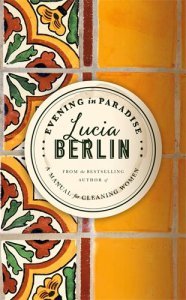
The publication of A Manual for Cleaning Women, Lucia Berlin’s dazzling collection of short stories, marked the rediscovery of a writer whose talent had gone unremarked by many. The incredible reaction to Lucia’s writing – her ability to capture the beauty and ugliness that coexist in everyday lives, the extraordinary honesty and magnetism with which she draws on her own history to breathe life into her characters – included calls for her contribution to American literature to be as celebrated as that of Raymond Carver.
Ranging from Texas, to Chile, to New Mexico and New York, in this collection Berlin writes about the good, the bad and everything in between: struggling young mothers, husbands who pack their bags and leave in the middle of the night, wives looking back at their first marriage from the distance of their second.
Evening in Paradise is a careful selection from the remaining Berlin stories – a jewel box follow-up for Lucia Berlin’s hungry fans.
My Thoughts:
I had never actually heard of Lucia Berlin prior to receiving this collection of short stories. Her short bio indicates that she led a colourful life and the stories included in this collection are reminiscent of the experiences indicated in her bio. Her style is rather conversational, witty and desperately honest, sometimes painfully so. Not all of the stories were to my taste, some were a little difficult to follow, almost rambling. Others were perfection, a little slice of somebody’s life you were invited to bear witness to. Many of the characters popped up in multiple stories, but at different stages of their life than when you had previously encountered them. It was interesting to see them within a different context, also from a different perspective. I can’t help but think that some of these stories are autobiographical, with the recurring themes and characters. For someone who generally doesn’t enjoy short stories, I found this collection to be very engaging.

October 28, 2018
New Release Book Review: The Invitation by Belinda Alexandra
About the Book:

In Gilded Age New York, money buys everything. What is your price?
Sometimes the ties that bind are the most dangerous of all…
Paris, 1899. Emma Lacasse has been estranged from her older sister for nearly twenty years, since Caroline married a wealthy American and left France. So when Emma receives a request from Caroline to meet her, she is intrigued. Caroline invites Emma to visit her in New York, on one condition: Emma must tutor her shy, young niece, Isadora, and help her prepare for her society debut.
Caroline lives a life of unimaginable excess and opulence as one of New York’s Gilded Age millionaires and Emma is soon immersed in a world of luxury beyond her wildest dreams – a far cry from her bohemian lifestyle as a harpist and writer with her lover, Claude, in Montmartre.
Emma hopes for an emotional reunion with her only family, but instead she finds herself in the vice-like grip of her charismatic and manipulative sister, who revels in the machinations of the ultra rich. As Emma begins to question her sister’s true motives, a disaster strikes, and New York society is stripped bare – beneath the glittering exterior lies a seething nest of deceit, betrayal, moral corruption … and perhaps even murder.
From the bestselling author of Tuscan Rose comes a mesmerising tale of two sisters and the dangers and seductions of excess.
My Thoughts:
‘‘The Gilded Age’ refers to a period in the history of the United States that coincides approximately with the Victorian era in Britain and the Belle Époque in France. It was a time of rapid economic growth, when great fortunes were made and millions of immigrants flooded into the country. It was also a period of extreme wealth for some and destitution and abject poverty for others. The term was first coined by Mark Twain in his novel The Gilded Age: A Tale of Today. ‘Gilded’ is not the same as ‘golden’. It implies a thin, shiny patina that covers something less attractive underneath.’ – Author note.
I don’t often start my reviews with a quote but this one really hones in on the themes explored within this novel. The type of extravagance detailed in this story is far from anything that I can credibly envisage. It’s obscene, and Belinda Alexandra contrasts this with the other side of New York with stunning clarity.
‘My fingers hovered over the pieces — they seemed too precious to touch. The tiara had seven spikes, the largest in the middle, each composed of an oval-shaped ruby surrounded by rose-cut diamonds. The lower semicircular band was a single row of diamonds over a layer of spherical pearls. The other pieces were equally magnificent. I couldn’t even guess how much Caroline had paid for the collection, but in terms of their historical value they were priceless.’
‘I shook my head, ashamed of what I and the rest of my family would look like to a woman in Mrs Dempsy’s situation, or to Mr Sauer, or the new mother whose baby would probably die. One of those hundred dollar bills Oliver had handed out at the ball for the men to roll into cigarettes would have kept these families housed for a year. What Caroline had spent on my costume and jewellery would have provided amply for a lifetime. If Lucy had handed out the party favours to the people in these slums, it could have changed the course of a whole neighbourhood’s history.’
The protagonist of this story is Emma Lacasse, a French writer and musician who travels to New York to reside with her estranged sister in a deal that borders on blackmail: Caroline will clear Emma’s debts if Emma grooms Caroline’s shy daughter into a catch for the debutante season. That Emma’s debts were actually incurred through paying for medical treatments and funeral expenses for their mutual grandmother has no effect at all on Caroline, who, quite frankly, is a sociopath. This becomes more and more apparent as the novel progresses. Hats off to Belinda Alexandra for creating a truly abdominal villain in Caroline. Few in literature would match her.
‘I would have been flattered by anyone else’s recognition of my positive attributes. But when Caroline cited them it sent a chill through me. Isadora had said that her mother took careful note of the tiniest details about people. I was sure that far from admiring me, Caroline was figuring out how to use those positive traits to her advantage.’
Given that this novel is set at the turn of the 20th century, there are themes of women’s suffrage explored, particularly within the context of women’s rights within a marriage. Emma herself was not married, and at the beginning of the novel it was all she hoped and dreamed for. I liked how this was turned on its head by the end of the novel, with Emma considering that her freedom was to be more sought after than the bonds of marriage and family. There were many examples within this story that cast marriage in the late 19th and early 20th centuries in a less than favourable light. Slightly off topic, but still related to the themes of women’s suffrage, I really loved this scene where Emma and her New York friends prepare to go out to dinner for one of their ‘bachelorette’ get togethers.
‘Why did everyone take off their corsets?’ I asked Florence when we reached the street. ‘Because we’re going to indulge in a feast and we don’t want indigestion and constipation tomorrow. Besides, if you always wear a corset your back and abdominal muscles never develop strength of their own, and your internal organs get compressed and possibly become misshapen. Those garments badly affect women’s health, but if we don’t wear them when we go to work we’re hounded by men and women alike. It’s difficult enough to move in a man’s world without being accused of being a woman of loose morals.’
The constraint of a corset is very much a mirror to the constraint placed upon women in general. Just as a corset was designed to keep everything in its rightful place, so too were all of the laws of restriction related to women’s lives. Whether residing in a gilded cage or a hovel in the slums, the entrapment for some of the women in this story was not dissimilar. Hand in hand with these themes was the profiteering from the hardship of others, abuse of power and the lack of a welfare state. Heavy themes, but all were woven into the story with a finesse that is very much Belinda Alexandra’s trademark.
The Invitation is a story filled with glamour and deceit. There is plenty of drama and suspenseful moments, but I feel there was an anti-climatic feel when it came to consequences for the atrocities committed by Caroline. This woman operated in a world of her own and I was far from satisfied with how she ended up. We see enough despicable people in real life getting away with all manner of atrocities. In the world of commercial fiction, I prefer it when the villain doesn’t get to live happily ever after.
‘My voice cracked at the full realisation that Caroline had purposely destroyed the most precious thing in my life. But why did that surprise me? My sister knew no boundaries.’

October 27, 2018
Page by Page Bookclub Titles for November/December
So, I missed October, hence, we’ve gone from August/September straight to November/December. I was conscious of this all through October, but time still got away from me. For November and December, we have another five terrific titles to choose from. Read one, two or all! Head over to Page by Page Bookclub with Theresa Smith Writes on Facebook to join in with the discussion.
The Invitation by Belinda Alexandra
[image error]
In Gilded Age New York, money buys everything. What is your price?
Sometimes the ties that bind are the most dangerous of all …
Paris, 1899. Emma Lacasse has been estranged from her older sister for nearly twenty years, since Caroline married a wealthy American and left France. So when Emma receives a request from Caroline to meet her, she is intrigued. Caroline invites Emma to visit her in New York, on one condition: Emma must tutor her shy, young niece, Isadora, and help her prepare for her society debut.
Caroline lives a life of unimaginable excess and opulence as one of New York’s Gilded Age millionaires and Emma is soon immersed in a world of luxury beyond her wildest dreams – a far cry from her bohemian lifestyle as a harpist and writer with her lover, Claude, in Montmartre.
Emma hopes for an emotional reunion with her only family, but instead she finds herself in the vice-like grip of her charismatic and manipulative sister, who revels in the machinations of the ultra rich. As Emma begins to question her sister’s true motives, a disaster strikes, and New York society is stripped bare – beneath the glittering exterior lies a seething nest of deceit, betrayal, moral corruption … and perhaps even murder.
From the bestselling author of Tuscan Rose comes a mesmerising tale of two sisters and the dangers and seductions of excess.
Lost Without You by Rachael Johns
[image error]
A fresh and poignant novel of family, journeys, past decisions … and dresses … from the ABIA award-winning, bestselling author Rachael Johns.
Four women, one dress, and the secret that binds them all…
On a special night that is supposed to be a celebration of new beginnings, Paige MacRitchie’s joy quickly falls away when her mother collapses during the speeches at her book launch. In the aftermath, and terrified of losing her, Paige decides she wants to make the ultimate tribute to her parents’ perfect marriage: she will wear her other’s wedding dress for her own big day.
There’s just one problem – her mum, Rebecca, no longer has the dress.
As Paige tries to track down the elusive gown, she discovers that Rebecca has a long-hidden secret that, if revealed, could blow her whole family apart. Her new friend Josie is at a crossroads too. She met her husband Nik when she was singing in an eighties-themed bar, but now she’s lonely, yearning for a family and wondering if Nik understands her at all.
And then there’s nurse Clara. When she married Rob Jones, an up-and-coming rock star, she thought she was in it forever. But now Clara needs to make a new life for herself and Rob can’t seem to understand that it’s over.
When the fates of these four women intertwine in an unexpected and powerful way, none of their lives will ever be the same again.
The Lost Man by Jane Harper
[image error]
The man lay still in the centre of a dusty grave under a monstrous sky.
Two brothers meet at the border of their vast cattle properties under the unrelenting sun of outback Queensland.
They are at the stockman’s grave, a landmark so old, no one can remember who is buried there. But today, the scant shadow it casts was the last chance for their middle brother, Cameron.
The Bright family’s quiet existence is thrown into grief and anguish. Something had been troubling Cameron. Did he lose hope and walk to his death? Because if he didn’t, the isolation of the outback leaves few suspects…
For readers who loved The Dry and Force of Nature, Jane Harper has once again created a powerful story of suspense, set against a dazzling landscape.
Arcadia by Di Morrissey
[image error]
A breathtaking Tasmanian tale of ancient forests; of art and science; of love and, above all, of friendship.
In the 1930s, in an isolated and beautiful corner of southern Tasmania, a new young wife arrives at her husband’s secluded property – Arcadia. Stella, an artist, falls in love with Arcadia’s wild, ancient forest. And when an unknown predator strikes, she is saved by an unusual protector…
Two generations later, Stella’s granddaughter, Sally, and her best friend, Jessica, stumble over Stella’s secret life in the forest and find themselves threatened in turn.
What starts as a girls’ adventurous road trip becomes a hunt for the story of the past, to solve the present, and save their future…
A modern mystery born in a timeless Tasmanian forest, from Australia’s favourite storyteller.
Where the River Runs by Fleur McDonald
[image error]
Ten years ago, thirty-year-old Chelsea Taylor left the small country town of Barker and her family’s property to rise to the top as a concert pianist. With talent, ambition and a determination to show them all at home, Chelsea thought she had it made.
Yet here she was, back in Barker, with her four-year-old daughter, Aria, readying herself to face her father, Tom. The father who’d shouted down the phone ten years ago never to come home again.
With an uneasy truce developing, Chelsea and Aria settle into the rhythm of life on the land with Tom and Cal, the farmhand, who seems already to have judged Chelsea badly. Until a shocking discovery is made on the riverbed and Detective Dave Burrows, the local copper, has to tear back generations of family stories to reveal the secrets of the past.
Chelsea just wants a relationship with her dad but will he ever want that too? Or will his memory lapses mean they’ll never get that opportunity?
The Page by Page Bookclub with Theresa Smith Writes is an online bookclub with an emphasis on books written by Australian Women, chatting in a setting that is above all else, friendly and inclusive. Flexible reading timelines and multiple titles to pick from each reading period. And lots of chatter…
Every two months (or thereabouts!), books will be posted here on the blog, and if you’re not on Facebook but would still like to read along, please feel free to let me know in the comments on this book post. The chatter will be in the group but I’d still love to hear your thoughts on the titles read.
To join the Page by Page Bookclub with Theresa Smith Writes, head over to the Facebook group and request to join. Look forward to seeing you over there!
October 25, 2018
New Release Book Review: Genealogy by Mae Wood
About the Book:
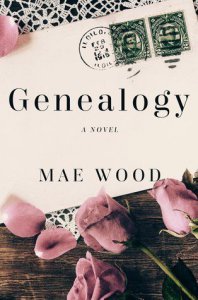
Inspired by real, hundred-year-old love letters.
At thirty-three and with her future unclear, Ali Waller finds her way home again. A box of long-forgotten love letters written to her great-grandmother holds the unlikely key to Ali finding her new path.
As she tracks down the letter writer and his descendants, Ali learns the magic of love, hope, and resilience.
Told by three characters, and across century and an ocean, Genealogy is an enchanting story about love and loss, taking chances, and embracing the surprises that life brings.
My Thoughts:
Inspired by the real 100 year old love letters belonging to the author’s great-grandmother, Genealogy is a moving story of love, missed opportunities and destiny in action.
‘Come with me, Alice. Stay with me, explore with me, journey with me. Marry me. Because when the ground gives way under my feet again, I don’t want to have been the man who sent you pink roses, too afraid to buy the red ones that I wanted to give you. I don’t want to be the man who worked so long to prepare the perfect place for you that he spent all of his life waiting. I’m sick of waiting. Beyond full of it. Without you I am hollow.’
More than just a love story, Genealogy is also a novel about finding yourself when your life has taken an unexpected turn. In many ways, it’s about second chances, not only at love and happiness, but for yourself, and tuning into what you really want out of life. Lessons from the past thread through this narrative and I enjoyed Ali’s journey of discovery – both of her great-grandmother’s letters that reveal Alice’s past life and Ali’s own personal growth as she stood at a crossroads within her life.
‘And at that moment, Alice became real to me. I could be her. I could be the woman writing letters. And a hundred years later, she could be me.’
I really enjoyed the arrangement of this novel, hearing Elliott’s story (the letter writer) as well as Alice’s version of events, each bracketed by Ali herself at key points in time. While I predicted the direction of Ali’s story, I appreciated the way it unfolded. Instead of the usual insta-love and happy ever afters that sometimes typify the romance genre, the growing connection between Ali and Ben, Elliott’s great-grandson, was more realistic with an open ended finish that inspired hope for the future of these characters. I particularly loved how the author paralleled the love letters between Elliott and Alice from a hundred years earlier with the email exchange between Ali and Ben. The same intent, but 100 years later, adjusted for the technology of our times.
“I don’t want to look back in twenty years and wish that I’d explored this with him. I don’t want to have a file on a computer somewhere of all our text messages and emails and let a big ‘what if’ haunt me.”
“I get it. You don’t want to be Alice with her box of love letters.”
Genealogy is a novel that has a wide appeal. The letters between Elliott and Alice contain a wonderful nod to early 20th century history and the contemporary story about Ali and Ben had a lot to offer in terms of contemplation and good feels. Family history is such an area of growing interest and I enjoyed how this novel taps into that, proving that for many of us, we still, no matter how far we’ve come, are often looking back over one shoulder for our roots, the beginning of who we are, as a means of measuring who we want to become.

October 24, 2018
New Release Book Review: Ghost Wall by Sarah Moss
About the Book:
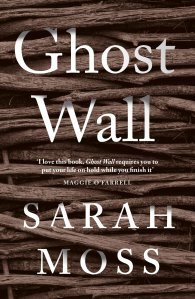
A masterclass in the art of the short, unnerving novel; a story of forbidden borders, haunted landscapes and bodies in danger.
‘This book ratcheted the breath out of me so skilfully, that as soon as I’d finished, the only thing I wanted was to read it again.’ – Jessie Burton
Teenage Silvie and her parents are living in a hut in Northumberland as an exercise in experimental archaeology. Her father is a difficult man, obsessed with imagining and enacting the harshness of Iron Age life. Haunting Silvie’s narrative is the story of a bog girl, a young woman sacrificed by those closest to her, and the landscape both keeps and reveals the secrets of past violence and ritual as the summer builds to its harrowing climax.
My Thoughts:
I first came to Sarah Moss’s writing with Bodies of Light, a novel I bought while away on holidays a few years ago. I read it curled up by a fire in a cabin in the snowy mountains and completely fell in love with her words. Not long after this, the sequel, Signs for Lost Children was released and I proceeded to devour that one as well. I don’t know if I can properly convey the brilliance of Sarah’s story telling, she’s certainly one of my favourite authors and I will forever drop everything to read whatever she releases next, which is pretty much what happened when her latest novel, Ghost Wall, arrived in my post box. It’s a slim novel, possibly a novella if you want to be precise, that is beautifully presented as a hardback with a dust jacket that is textured to mimic a woven basket, which fits into the theme of the story perfectly. I don’t usually dwell on covers too much, but this one stands out for its cohesive design.
For such a short novel, 150 pages, it really does contain a powerful story. Silvie is on holiday with her parents and they have joined with a professor of history and three of his students, two young men and a young woman, for an authentic experience in recreating life during the Iron Age. Not my idea of a great holiday, nor is it Silvie’s or her mother’s, but neither of them are considered to have an opinion – on anything. They are both perilously at the mercy of Silvie’s father, a man who is obsessed with British history, particularly the macabre and more brutal aspects, which uncannily, matches his persona to perfection.
‘He glanced at me. Is he always like that, Silvie? I mean, sorry, I know he’s your dad and all but. Like what, I said, a show-off and given to brutality, yes, actually, mostly he is, sorry. I could see Dan and Pete exchanging glances, almost see the words cross the air between us.’
Silvie’s father is a strange man, incredibly chauvinistic and full of his own importance and expert knowledge on ancient British history, ironic considering he is actually a bus driver, not an historian at all. He is a man who feels that he is trapped in the wrong life, the bitterness of it spilling out into blame, directed entirely towards his wife and daughter, who he brutalises with startling regularity. He is a despicable human being, and when you think you’ve seen him at his worst, he just comes back with something more vile. He is particularly interested in the bog people, not something I’ve ever known much about, although I do recall watching a BBC history program that detailed the way the bogs would preserve bodies. It’s kind of fascinating while also being macabre, but what I took away from this novel, was that if you were a bog woman, the odds were pretty much in favour of you being sacrificed, a fact that Silvie’s father seemed to thrive on.
‘The bog seals around you, and it will of course go further than skin, or at least will fill the inner skins of every orifice, seeping and trickling through the curls of your ears, rising like a tide in your lungs, creeping cold into your vagina, it will embalm you from the inside out. The boot it took had been firmly laced over my ankle; I couldn’t have taken it off without undoing the laces but somehow the bog managed it in the struggle without me even noticing.’
Silvie is an example of a young woman who has been indoctrinated into the normalisation of violence against women. In sharp contrast, Molly, one of the young students along for the trip, abhors violence against women, is repelled by Silvie’s father and his outward misogyny. Sarah brings these two young women together at a crucial time in Silvie’s life. As to Silvie’s mother, I felt so sorry for her, the years of belittling and unchecked violence had hollowed her out. Silvie, despite her fear of her father, was not as far gone as her mother. Small moments of defiance would rise to the surface, but the penalty for these would weigh heavily on Silvie.
‘Because they are men, I thought, because they’re in charge, because there will be consequences if you don’t. I didn’t see how she could not know that.’
The brilliance of Sarah Moss’s writing is evident in the multiple parallels she draws: between Silvie and Molly; between Silvie and the imagined life of a bog girl whose body had been on display in a museum that Silvie visited with her father. These connections tighten as the story progresses. When we reach the horrifying conclusion, we witness the full extent of the damage Silvie’s father has done to her over the years, with her passive acceptance of the inevitability of his actions. Again, Molly provides a sharp contrast in her refusal to accept Silvie’s fate. Sarah also demonstrates with chilling clarity, just how easily some men slip into a pack mentality, partaking in violence they would not normally consider if not for the influence of those around them.
‘There is an art to holding her in the place she is entering now, on the edge of the water-earth, in the time and space between life and death, too late to return to the living and not time, not yet, not for a while, to be quite dead.’
At times distressing, yet always honest, Ghost Wall is an important novel, well timed and incredibly on point. It’s beautifully written with a very personalised style of narrative that will not fail to impact upon you greatly.
‘They weren’t dead, the bog people, not to those who’d killed them. They had to be pinned to their graves with sharp sticks driven through elbow and knee, trapped behind woven wooden palings, to stop them coming back, creeping home dead and not dead in the dark.’





